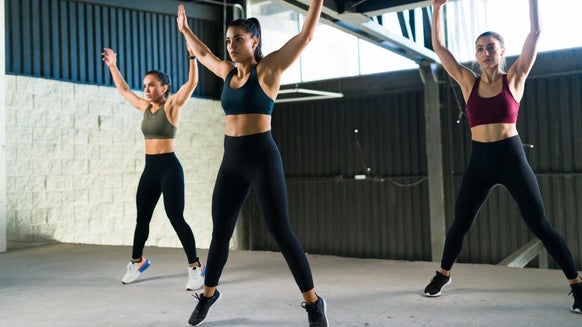Expert Answers Your Biggest Back-To-Gym Questions

Back at the gym but got some questions about your nutrition? Well, you’re not alone.
We asked our Instagram followers for their biggest back-to-gym concerns and confusions and put them to an expert to break down exactly what you need to reach your goals.
Let’s get started...

What are the best muscle building foods?
Building muscle isn’t just about lifting big in the gym, you’ve got to eat big too. When it comes to muscle building, the two most important macronutrients are carbohydrates and protein.
This power couple combined will pave the way to muscle mass. Carbohydrates are especially important for muscle hypertrophy (growth), whilst protein is important in muscle synthesis and repair (recovery). 1
Carbohydrates serve as our bodies primary fuel source and they’re especially important during high-intensity exercise sessions. Without sufficient carbohydrate in the tank, your body will resort to using protein as an energy source.
This puts us at a disadvantage with muscle growth as protein is needed for recovery, growth and repair. When it comes to muscle building, we need to focus on different nutrient timing zones:
2 hours before your session
This is the time to eat complex carbohydrates with protein. This will lead to a steady release of blood sugar, as well as keep you feeling full. Ideally you want this snack to be low in fibre and fat.
Why not try oats with yoghurt and fruit, granola and yoghurt, a bagel with peanut butter, or a protein shake with milk.
30-90 minutes before your session
At this point, if you’ve not already eaten, you want to be opting for 30-60 grams of fast fuel — simple carbohydrates. Here you also need to make sure that the option is low in fat, fibre, and protein to avoid an upset stomach.
Simple sugars and refined options are more ideal pre-training as they tend to be lower in fibre and provide energy faster than complex carbohydrates.
Tasty options include fig bars, fresh fruit, dried fruit, 100% fruit juice, a white bagel , English muffin or potato, and cereal with milk.
After your session
This is when you want to be combining carbohydrates and protein in a ratio of 3-4:1 (Carb:Protein). After your session you want to be focusing on the 3 R’s of recovery: Refuel (with carbs), Repair (with Protein) and Rehydrate (with fluids).
Refuel : 3:1 ration of carb to protein ration would mean around 30-40g of carbohydrates
Repair : This is usually at 0.3g/protein / kg (10-30g for most individuals) . Rehydrate : Fluids + electrolytes. These could be hydrating fluids like water, sports drinks or 100% fruit juice.
Great post-workout snack ideas are a smoothie that contains high protein yoghurt or protein powder, or fruit, and some milk or a chicken/tofu wrap with a glass of orange juice.

Is a high sugar diet bad even if I'm in a calorie deficit?
Hoping you can live off a diet of donuts and sweets and still lose weight? First off, we need to define exactly what classifies as sugar. Sugar is a form of carbohydrate and when carbohydrates are consumed, they’re broken down into glucose which serves as our bodies’ preferred fuel source.
Secondly, there are different types of sugar. In general, these are known as complex and simple carbohydrates. Complex carbohydrates are formed when there are more than three sugar molecules, whereas simple sugars contain only one of two possible sugar molecules. So, knowing that, sugar is not necessarily ‘bad’, as it serves as our bodies fuel source. So, sweets and donuts...?
Well, first off, there’s a reason you still feel hungry even though you’ve polished off the lot. A diet high in
This is because you may lack nutrients that are important for your health. A diet high in refined sugar (added sugar) is not considered healthy in excess amounts in your blood stream as it can decrease your insulin sensitivity and lead to insulin resistance.2
Poor insulin sensitivity prevents glucose from being utilised as energy, or being stored as energy (glycogen) in our liver and muscles. A build-up of this glucose can result in damage to blood vessels and bigger long-term problems.
It’s important to try opt for an 80/20 approach which allows moderation. 80% of the time you make the healthier choices of fruit, veg, wholegrains, lean proteins and healthy fats and 20% of the time you allow for flexibility and refined sugar intake.
So, you can still enjoy a donut from time to time, but what you eat matters just as much as how much you eat.
When should I take creatine around my gym workout?
Ah, creatine! The wonder supplement of the gym world... You may have heard your gym buddies rave about it, but how exactly to use it around your workouts can feel a bit confusing.
Put simply, creatine improves performance of short term, high-intensity exercise. This is especially useful for sports such as sprinting, jumping and weightlifting. Creatine may enhance muscle protein synthesis and glycogen storage.3 The best time to take Creatine is before and after a training session usually at 5g per day. 4
Ingesting smaller amounts of creatine monohydrate (e.g. 2-3 g/d) will increase muscle creatine stores over a 3-4 week period. However, the performance effects of this method of supplementation are less supported.5
The addition of creatine monohydrate (0.1 g Cr/kg/day) to a carbohydrate and protein meal post-training may facilitate even greater adaptations to resistance training. There's also some research that suggests you can increase muscular retention of creatine by combining it with carbohydrates and protein after exercise.6

How hard should I train on my first session back?
It would be all too easy to race into the gym and go for that 1 rep max to reached last year. We can tell you now, that’ll just end in tears. After months of home workouts with minimal weights, it’s safe to say that you’re going to see regressions in how heavy you lift and going too hard too soon may result in premature injury.
The last thing you want is injury as this may set you back further in trying to achieve your goals. Start slowly, and gradually build up over a 4 to 8-week period.
Warming up and cooling down from your workouts can make all the difference too. Make sure that before your sessions you opt for more dynamic stretches and spare 15 minutes after your session for static stretching.
Is the anabolic window real?
Historically, the anabolic window is referred to ingesting carbohydrates and protein within a 30 minute to 2-hour period after your training session.7
This was thought to be the period of time when uptake of glucose and protein was at its best to aid muscle recovery and growth.
According to the International Journal of Sports Nutrition high-quality protein dosed at 0.4–0.5 g/kg of lean body mass at both pre- and post-exercise is a simple, general guideline that reflects the current evidence showing a maximal short period of anabolic (muscle building and repair) effect of 20–40g.8
Evidence-based support for such an “anabolic window of opportunity” is far from definitive.9 If you’re going into a workout in a fasted state, then it’s important to focus on replenishing with protein and carbohydrates after a session.
However, if you’re going in there all fuelled up on carbohydrates 1-2 hours beforehand, then there's no specific ‘window’ for consumption afterwards. The next scheduled protein-rich meal is likely to be just fine for maximising recovery and muscle repair and growth. 10
Take home message
With the excitement over gyms reopening, it can be all too easy to rush in there without even thinking about what you’re doing, eating, or what you really want to get out of it. Hopefully these expert answers will help you onto the right track with your fitness goals.







